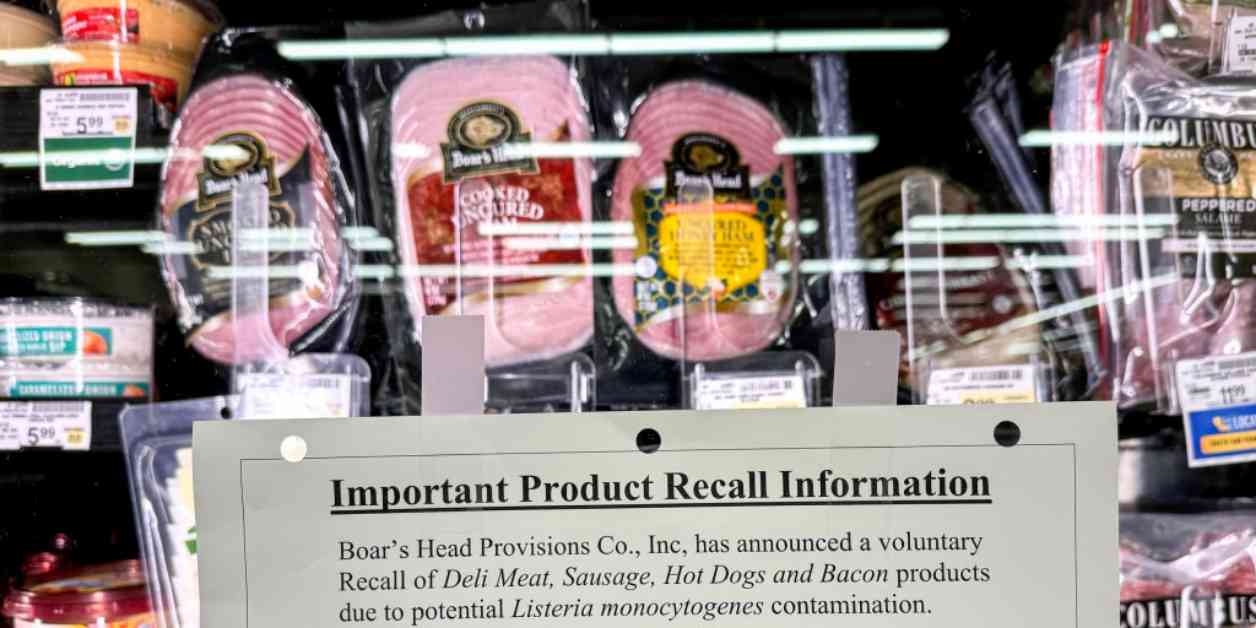Five more people have tragically lost their lives, and over a dozen others have fallen ill in a recent listeria outbreak linked to Boar’s Head deli meat, according to an update from the Centers for Disease Control and Prevention. This brings the total number of deaths to eight, with a staggering 57 individuals hospitalized since the outbreak began. The CDC has labeled this outbreak as the largest listeriosis event since 2011 when over 30 individuals perished due to contaminated cantaloupe.
The outbreak was initially linked to Boar’s Head’s Strassburger Brand Liverwurst, prompting the company to issue a recall on July 25. Concerns arose regarding the presence of Listeria monocytogenes in the meat produced at the Jarratt, Virginia facility. As the situation evolved, the recall was expanded to include a staggering seven million pounds of deli meat, encompassing every item manufactured at the facility. In a statement released on August 15, Boar’s Head expressed deep regret over the impact of the recall, emphasizing their commitment to food safety and consumer well-being. The company extended their sympathies to affected families, acknowledging the profound sorrow felt for those who have suffered losses or endured illness.
Tragically, the fatalities have been reported across multiple states, including Florida, Tennessee, New Mexico, South Carolina, Illinois, New Jersey, and Virginia. The age range of the affected patients spans from 32 to 94 years old, with a median age of 77. Data analysis conducted by health authorities revealed that the contamination primarily occurred in deli-sliced meats, including Boar’s Head liverwurst. The bacteria responsible for the outbreak, Listeria monocytogenes, is easily spread via deli equipment, surfaces, hands, and food items. It is important to note that refrigeration does not eliminate the presence of this harmful bacteria.
Symptoms of listeria infection can manifest as fever, chills, muscle aches, nausea, and diarrhea, as outlined by the Mayo Clinic. In cases where the infection progresses to the nervous system, individuals may experience stiffness in the neck, headaches, and loss of balance. Particularly vulnerable populations include individuals with weakened immune systems, pregnant women, and those aged 65 and above. The severity of listeria infection underscores the importance of swift action to prevent its spread and mitigate its impact.
Recall and Response
The rapid response to the outbreak by Boar’s Head, culminating in a widespread recall of their products, underscores the company’s commitment to consumer safety. By voluntarily recalling all items produced at the Jarratt, Virginia facility, Boar’s Head aims to minimize the risk of further contamination and prioritize the well-being of their customers. The recall serves as a crucial step in containing the spread of listeria and preventing additional illnesses or fatalities.
In light of the outbreak, health authorities have urged consumers to exercise caution when purchasing and consuming deli meats, especially those sourced from facilities under investigation. The importance of proper food handling, storage, and preparation cannot be overstated in safeguarding against foodborne illnesses. By adhering to recommended guidelines and staying informed about product recalls, individuals can protect themselves and their families from potential health risks associated with contaminated food items.
Preventive Measures and Awareness
Heightened awareness surrounding listeria contamination serves as a critical component in preventing future outbreaks and safeguarding public health. Educating consumers about the risks associated with improperly handled and stored deli meats can empower individuals to make informed choices regarding their dietary habits. By promoting good food safety practices, such as thorough cooking, refrigeration, and sanitation, the likelihood of listeria contamination can be significantly reduced.
Additionally, health authorities emphasize the importance of early detection and prompt treatment in cases of suspected listeria infection. Recognizing the symptoms and seeking medical attention can expedite the recovery process and prevent complications associated with the bacteria. By remaining vigilant and proactive in monitoring food safety standards, both consumers and food producers can collaborate to mitigate the risk of future outbreaks and protect vulnerable populations from harm.
Conclusion
In conclusion, the recent listeria outbreak linked to Boar’s Head deli meat has highlighted the critical importance of food safety and regulatory oversight in safeguarding public health. The tragic loss of lives and illnesses stemming from contaminated products underscores the need for stringent quality control measures and rapid response protocols in the food industry. As investigations continue and efforts to contain the outbreak intensify, it is essential for consumers to remain informed, exercise caution when purchasing deli meats, and prioritize safe food handling practices in their daily routines. By working together to address the root causes of foodborne illnesses, we can strive towards a safer and healthier future for all.

















